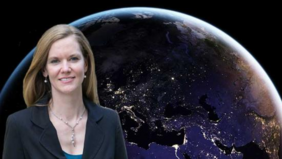Guest lecture by Dr. Eleanor Stokes, NASA
| Datum: | 24.11.2023, 15:00 - 18:00 Uhr |
The Geolingual Studies Team, the Department of English Linguistics and the Department of Remote sensing cordially invite you to a guest lecture by Dr. Eleanor Stokes, Program Manager for the Earth Information Center at the NASA Headquarters in Washington D.C. The title of the talk is “NASA’s Earth Information Center – getting data and insights about planetary change out to the science-curious public”, and it will take place on 24 November 2023 at 3 pm s.t. in the seminar room 3 at the Department of Remote Sensing (John-Skilton-Straße 4a, Hubland Campus Nord). Everybody welcome!
The transformation of environmental conditions across the planet will impact the lives and livelihoods of people in complex ways. NASA’s Earth Information Center (EIC), a new initiative unveiled in June of 2023, aims to improve the public’s understanding of global environmental change and to deliver critical data and information about our changing planet directly into the hands of people in ways that they can immediately use. For over fifty years, NASA’s satellites have collected data on Earth’s land, ecosystems, water, air, temperature, and climate, in collaboration with Federal partners. The EIC offers this data and derived scientific insights to the public through visualizations, interactive displays, and immersive experiences -- helping visitors understand the Earth's intricate interconnected systems and make decisions about how to respond to climate change in their own lives.
In this talk, I’ll introduce the general mission of the Earth Information Center and trace the path and process of gathering, interpreting, and translating data into actionable information. The talk will discuss converting nighttime observations from Suomi-NPP’s Visible Infrared Imaging Radiometer Suite Day Night Band (VIIRS-DNB) to actionable insights about power outages as an example—following the path from first light, to measurement and validation, to analysis, interpretation, translation, presentation and finally application. The goal of the talk is to use the story of this piece of data to show how the Earth Information Center functions as a collaborative, coordinated effort, across NASA centers and across federal agencies, between instruments, scientists, artists, communicators, and users. It’s a hopeful story, about how scientific developments are being used to engage the public and foster understanding, appreciation, and action around protecting our home.
Dr. Eleanor Stokes serves as Program Manager for the new Earth Information Center at NASA Headquarters in Washington DC. Prior to joining headquarters, she led mission concept development and scientific research activities for NASA’s Black Marble. She was a pioneer user of Suomi-NPP VIIRS Day/Night Visible Band data, refining the early processing algorithms and developing novel methods to track urbanization dynamics. She is a trained as an urban land scientist, is particularly interested in how urban environments shape the environmental behaviors of the people who live within them. She is a contributing author on the most recent UN Global Assessment Report on Disaster Risk Reduction (GAR 2022), and has received honors for her scientific contributions, including being named as one of ESRI’s “Women Stars of Spatial Science” (2020), Geospatial World’s 50 Rising Stars (2021), and earning the Kuno award for scientists creating transformative social impact (2022).



